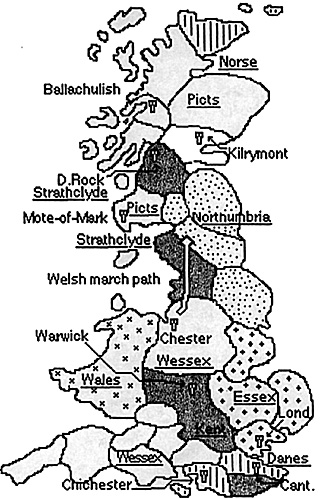
(This continuing series of reports covers the progress of an ongoing campaign, set in Dark Ages Britain, being waged by a around Columbus HMGS Great Lakes members. Players plot monthly turns and resolve battles using De Bellis Antiquitatis rules. This issue covers three turns -- Summer of 817 A.D.)
The long summer days of the north rang with the sound of hammering, The Picts, their armies a riot of tartan color in the lingering sun, tightened their grip around two of Strathclyde's major fortresses. InJuly, after eight months of siege, the Briton capital of Dumbarton Rock finally fell. King Christian Ravenhawk escaped to the hills, vowing to raise an army to break the siege of Mote-of-Mark, which still held out after four months. His brave words received a cold dash when word arrived that last year's conquest, the province of Dumfries, had been retaken by his old enemy, Northumbria.
 The days of confusion in Northumbria seemed over. A second
Anglian army marched to lay siege to the mighty walls of York -- lost to the
Norsemen last year. The Norse jarl ruled the city with an iron hand, though,
and it held out all summer. The jarl knew it had to, for the dragonships were seeking prey
elsewhere. The Orkney island capital of Kirkwall fell to a Norse assault that
followed three months of siege. The garrison was slaughtered. As summer drew
to a close, the Vikings boarded their longships and sailed from the island,
unaware that both the Pict and St~athclyde navies had launched their fleets, too.
In the south, the Norse continued to harass the coasts of Britain. They redoubled
their sieges of Kentish Chichester and Wessex Dorcastor. In July, Chichester fell
to another assault, making Sussex the third province in Britain they ruled.
The days of confusion in Northumbria seemed over. A second
Anglian army marched to lay siege to the mighty walls of York -- lost to the
Norsemen last year. The Norse jarl ruled the city with an iron hand, though,
and it held out all summer. The jarl knew it had to, for the dragonships were seeking prey
elsewhere. The Orkney island capital of Kirkwall fell to a Norse assault that
followed three months of siege. The garrison was slaughtered. As summer drew
to a close, the Vikings boarded their longships and sailed from the island,
unaware that both the Pict and St~athclyde navies had launched their fleets, too.
In the south, the Norse continued to harass the coasts of Britain. They redoubled
their sieges of Kentish Chichester and Wessex Dorcastor. In July, Chichester fell
to another assault, making Sussex the third province in Britain they ruled.
The Danes startled their Kentish besiegers at Rochester and marched out for battle. Their ferocity was too much for the Saxon fyrd, and they were driven from the field in rout. Eorl Aelfred proved his worth to his king, though, thawing the ice from his men's veins and infusing it with steel. On the way home, they brushed aside a smaller Danish force that had besieged Dover. Aelfred vowed he and his army would not run from the Vikings again -- they knew the mettle of their foe, now. So, when the Danish main army marched north to Londinium, chasing off the East Saxon army that had been trying to retake its capital, Aelfred followed. When the Danes invaded Essex's Saeten, he besieged Canterbury in North Kent. A stubborn man of a stubborn people, Aelfred proclaimed Kent would withstand the Vikings.
While some kingdoms worried about their survival, King Egbert of Wessex dreamed of dominion. His armies flexed his kingdom's muscle by smashing the forces of Mercia and chasing them into the bogs of Lindsey. In the south, a scraped-together host broke the Norse siege of Dorcaster and drove the invaders out to sea. Meanwhile, his siege of the old Roman city of Chester, one of Mercia's last fortresses in the center of England, dragged on into its fourth month.
Summer of 817 A. D. saw two bears well awake from slumber in Britain -- one in the north in the form of the tattooed Picts, and another in the south, the mighty Wessex. Vipers hissed their challenges, the Vikings and now the Northumbrians, but the bears appeared ready to shoulder aside the other kingdoms in vying for dominance on the island.
More Bretwalda
Winter 816 A.D.
Winter 816 A.D.
Spring 817 A.D.
Summer 817 A.D.
Autumn 817 A.D.
Winter 817-818 A.D.
March and April 818 A.D.
May and June 818 A.D.
Who Won? Part 1
Who Won? Part 2
Who Won? Part 3
Back to The Herald 28 Table of Contents
Back to The Herald List of Issues
Back to MagWeb Master Magazine List
© Copyright 1999 by HMGS-GL.
This article appears in MagWeb (Magazine Web) on the Internet World Wide Web. Other military history articles and gaming articles are available at http://www.magweb.com